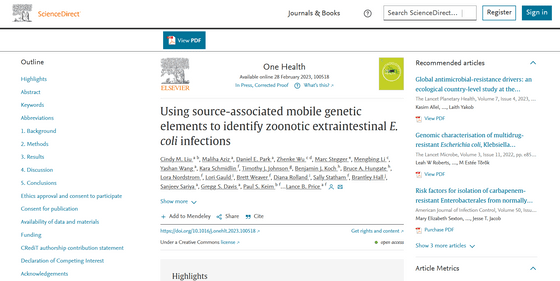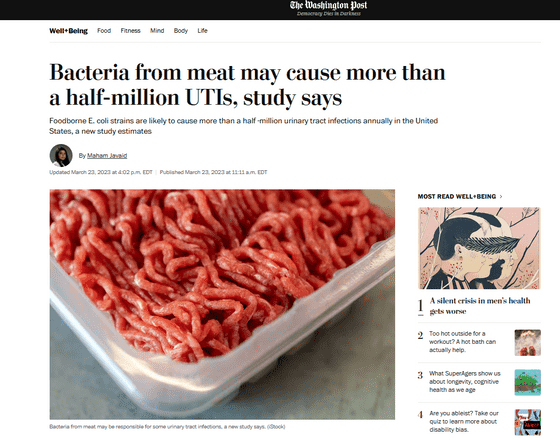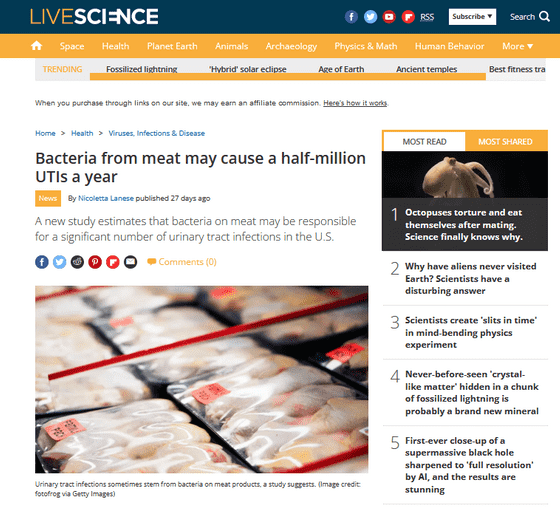It turns out that 500,000 people a year in the United States alone ``have urinary tract infections caused by meat''

Most
Using source-associated mobile genetic elements to identify zoonotic extraintestinal E. coli infections - ScienceDirect
https://doi.org/10.1016/j.onehlt.2023.100518

Bacteria from meat likely to cause urinary tract infections, study says - The Washington Post

Bacteria from meat may cause a half-million UTIs a year | Live Science

Escherichia coli is the cause of many urinary tract infections, so elucidation of the infection mechanism of how Escherichia coli invades the urinary tract is essential for prevention and treatment. Previous studies have shown that bacteria inhabiting meat can cause urinary tract infections, but details such as how food-borne E. coli infects the urinary tract and the frequency of occurrence were unknown. .
Therefore, a research team led by Lance Price of the George Washington University Milken Institute of Public Health compared urinary tract infection samples collected at a medical institution in Flagstaff, a city in northern Arizona, with those in the area. We conducted a study comparing the genomes of E. coli attached to meat sold at supermarkets.

The researchers examined 1,188 samples from patients with urinary tract infections and 1,923 samples of E. coli found in raw chicken, pork and turkey sold at supermarkets. Eight percent of all urinary tract infections were found to be caused by meat-borne Escherichia coli.
Approximately 6 to 8 million people in the United States suffer from urinary tract infections annually, 85% of which are caused by E. coli. Furthermore, if 8% of them are derived from meat, it will be calculated that about 480,000 to 640,000 Americans per year suffer from urinary tract infections due to eating meat.

In the genome analysis, the research team paid particular attention to DNA sequences called
For example, when a medical worker arrives at work from home, he or she changes from casual clothes to a white coat. Similarly, E. coli that infects birds acquires mobile genetic elements adapted to birds, so if we find E. coli with mobile genetic elements unique to birds in humans, we speculate that they were infected by eating chicken recently. We can.
Regarding the results of this study, Mr. Price said, ``Most people know that eating uncooked meat or ingesting bacteria on meat will upset their stomach. of E. coli is the trigger for urinary tract infections in hundreds of thousands of people.'
The study raises questions about why eating meat causes urinary tract infections. First, E. coli, which lives in the bodies of livestock, etc., adheres to the meat when the livestock is dismantled. It enters the body when humans eat raw or undercooked meat. Some E. coli ingested by humans die due to gastric acid, etc., but they survive and settle in the intestines, and if they somehow spread throughout the body, they can cause opportunistic infections. When this occurs in the bloodstream, it causes sepsis, etc., but it is thought that it may become a urinary tract infection by reaching the urinary tract.

Therefore, experts should minimize contact with raw meat by ensuring that it is thoroughly cooked when eating and avoiding cross-contamination by washing hands and cutting boards after handling raw meat. I suggest you limit it. The study also identified strains of E. coli that are particularly dangerous to humans, so new strategies such as vaccination of livestock are now an option.
“We need new ways to prevent infections,” Price said. It will demand accountability,' he said.
Related Posts:







